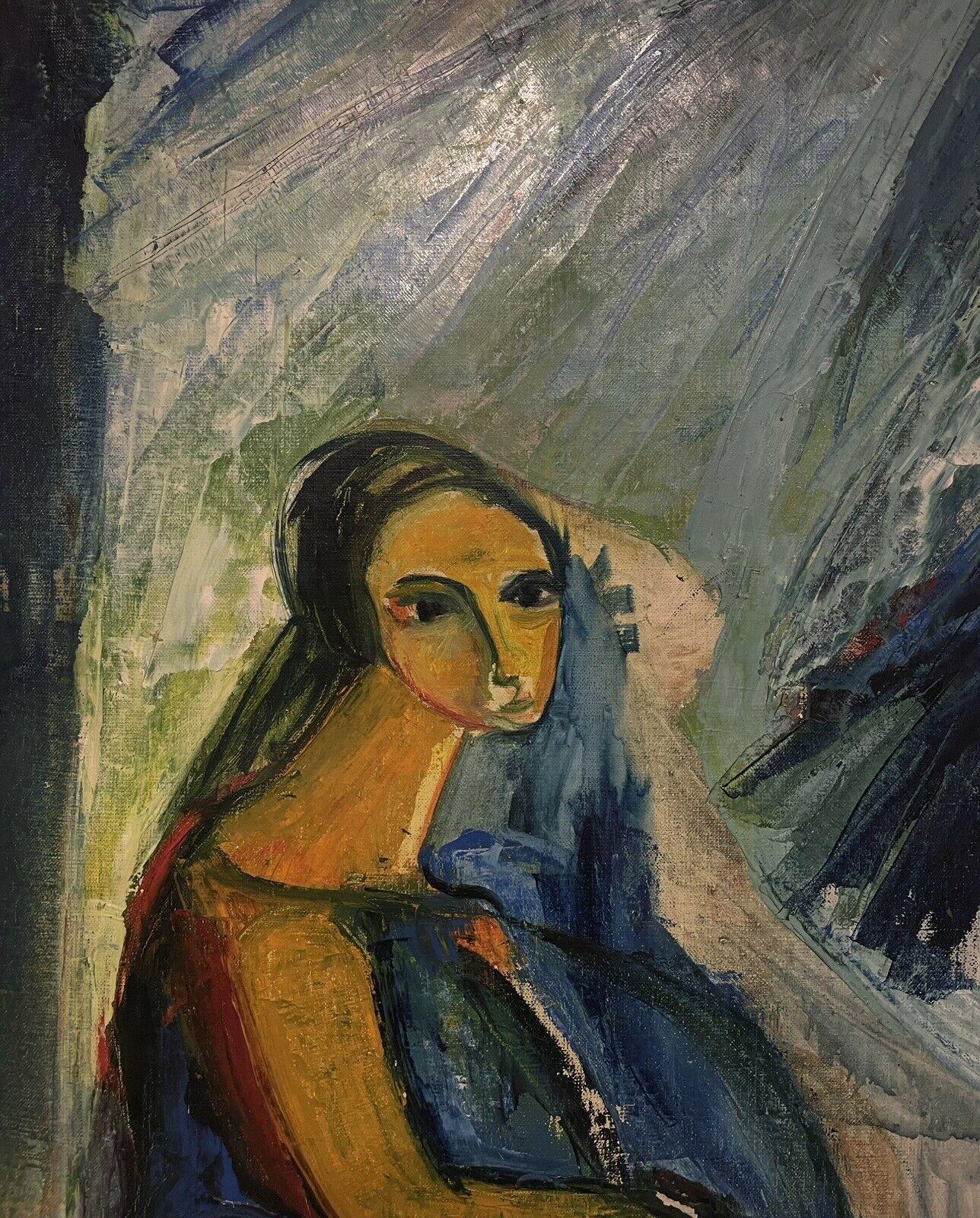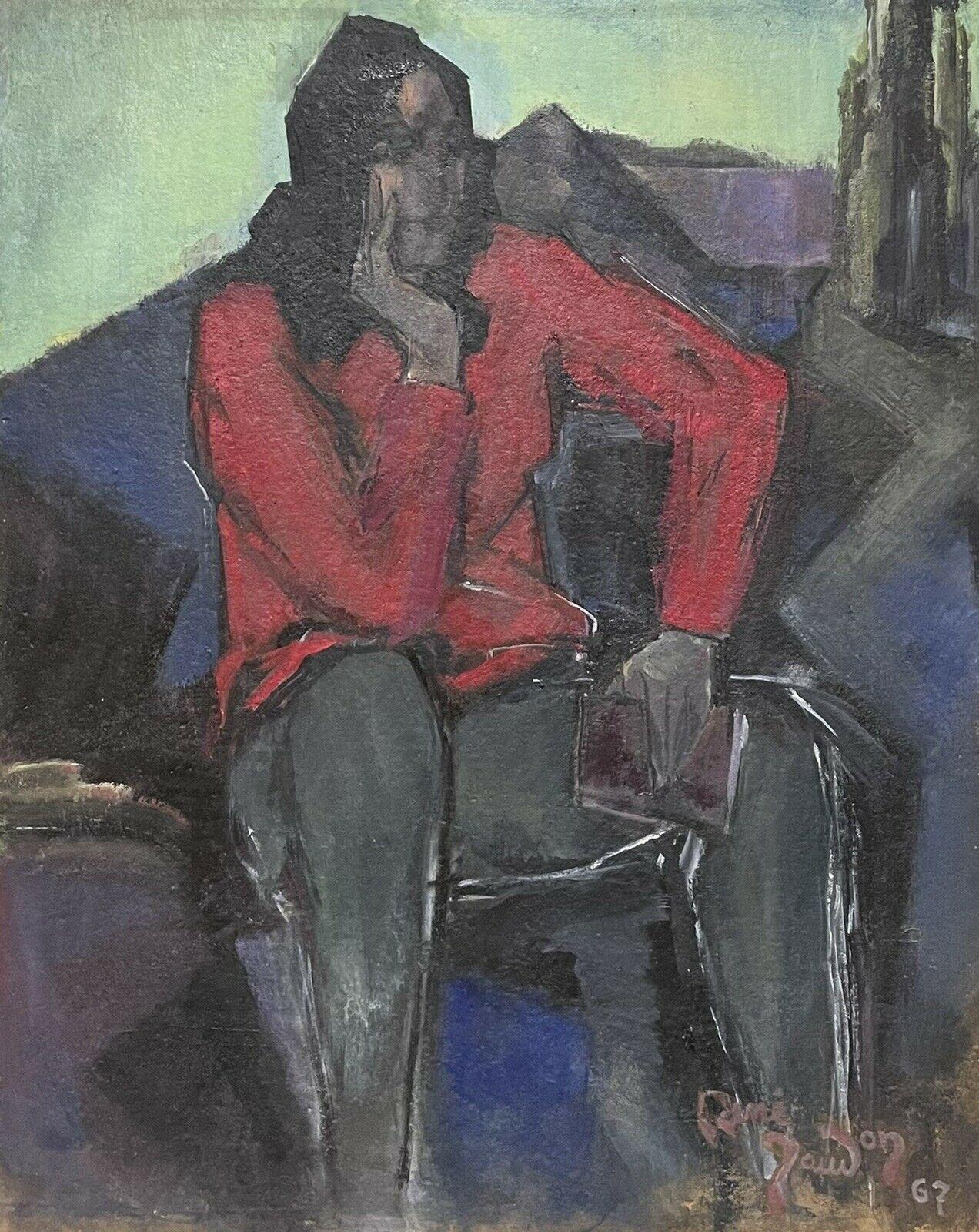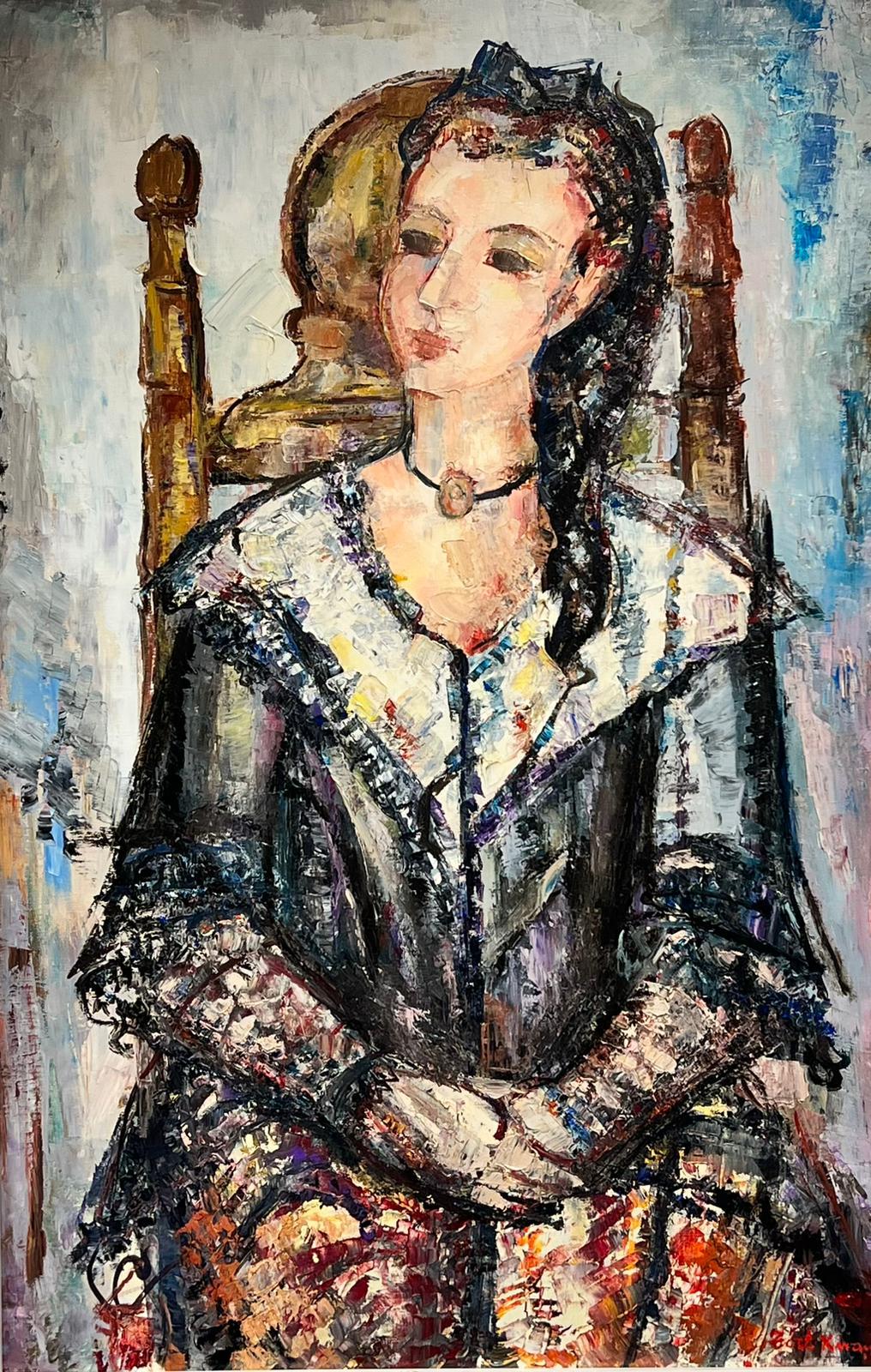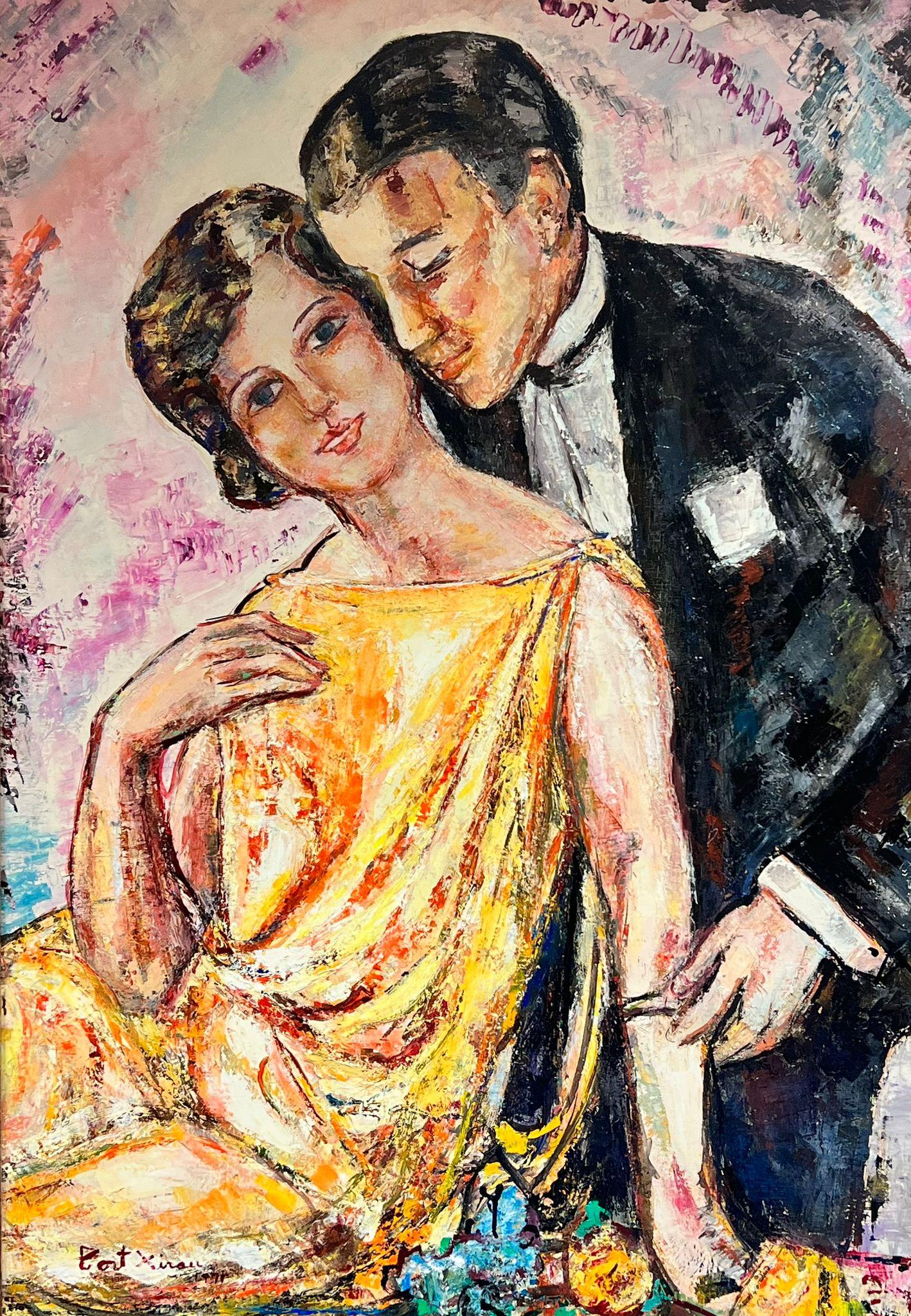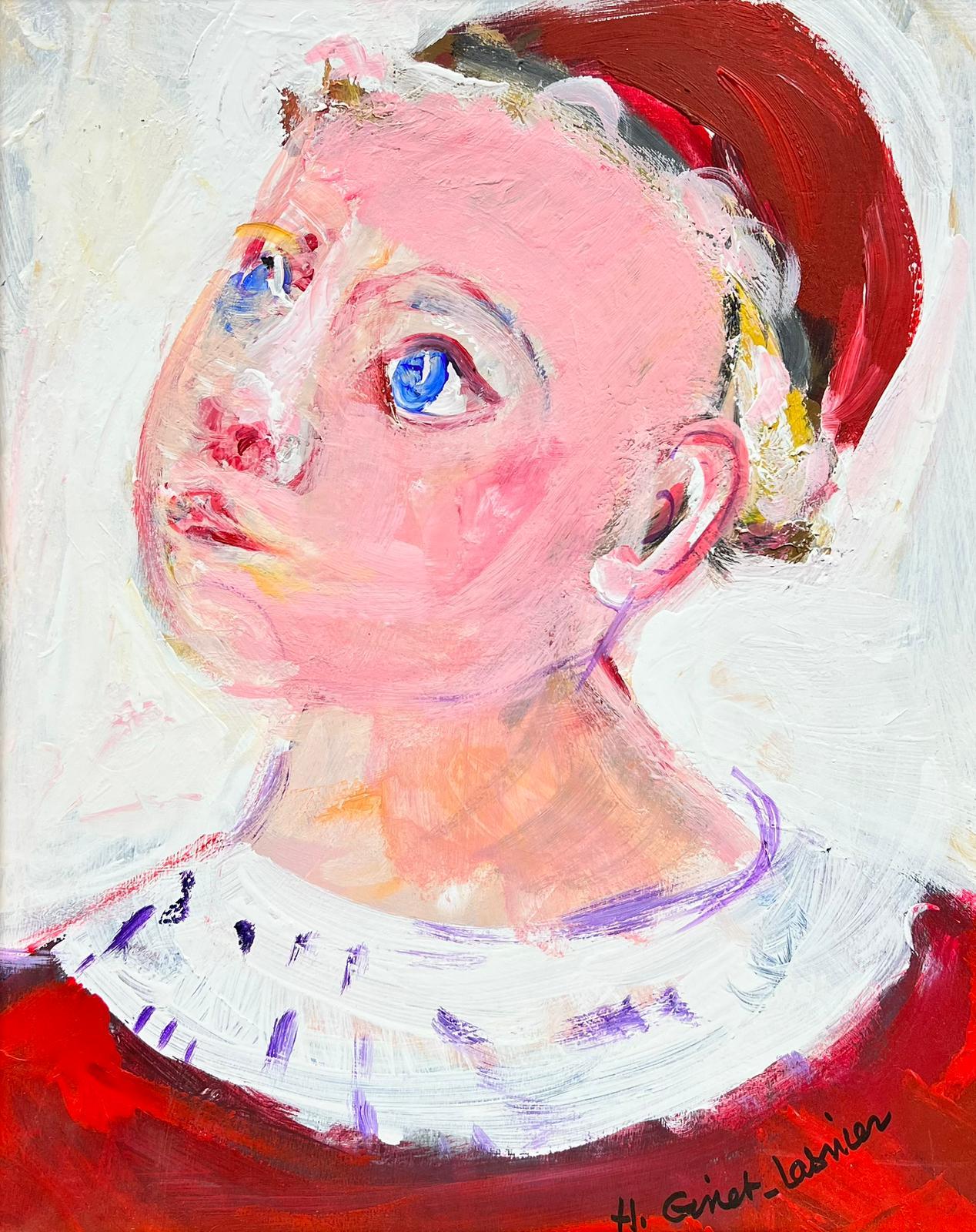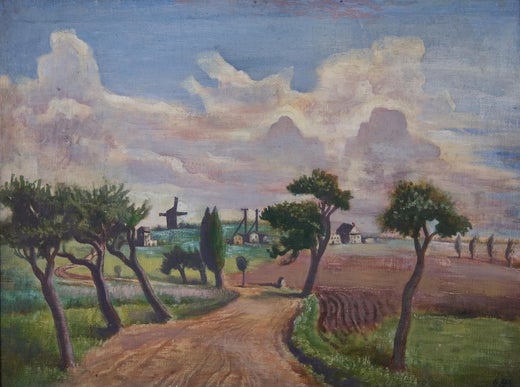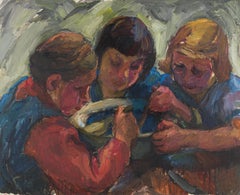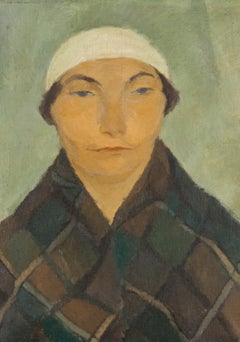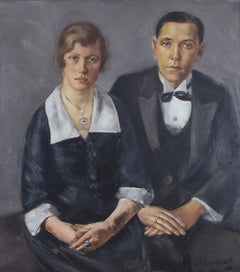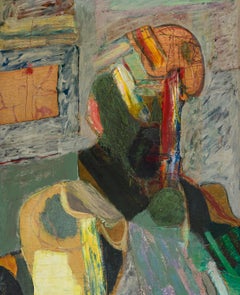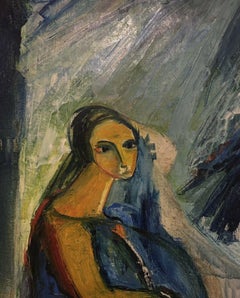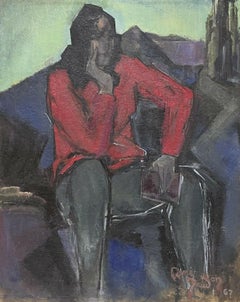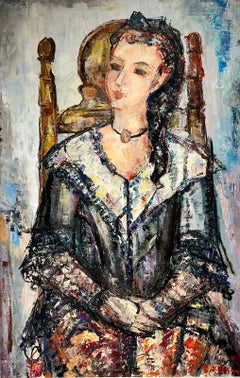Items Similar to Angel Bride
Want more images or videos?
Request additional images or videos from the seller
1 of 3
August Wilhelm DresslerAngel Bride
On Hold
$3,075.99
On Hold
£2,285.03
On Hold
€2,566
On Hold
CA$4,271.37
On Hold
A$4,661.06
On Hold
CHF 2,444.80
On Hold
MX$56,610.08
On Hold
NOK 30,536.93
On Hold
SEK 28,858.92
On Hold
DKK 19,534.69
About the Item
August Dressler is one of the painters of the New Objectivity. He is one of the lesser-known artists of the Weimar era, but he too, like his famous contemporaries Georg Grosz, John Heartfield, and Otto Dix, was committed to social and political issues.
The Berliner-of-choice defied stubbornly the summary classification. Dressler acted truthfully to his origin, temperament and insight as an individual who presents his bond as obligation, who takes his program as template and his slogan as abomination. Only few painters of his generation restrain so inconspicuously from the revolutionary storm and new trends that found its most effective expression in Expressionism of ” the Bridge” group and in the mystical works of the ‘Blue Rider’. Dressler’s self-imposed isolation is based neither on his capriciousness nor is it intentional – it is simply one of the inner necessities of his artistic existence.
One does not do justice to his work, if one tries to interpret only the visible facts, the artistic or the technical qualities in Dressler’s works. This painter lived his destiny with a stubbornly determined consequence of his fate: the pictures are nothing else than the graphic metaphors of the ‘introverted gaze’. He experienced grief and loneliness already during his youth. Dressler learns early about the shadow side of human existence – it becomes the basis of the way he perceived the world. ” I cannot separate myself from what has established me ” – there was a very immediate connection and solidarity between the painter and his personal experiences (l’art pour l’art attitude). Thus Dressler identifies himself with those embodiments of petty-bourgeois narrowness, with those disappointed and abandoned, with those who appreciate simple joys of life and those with quiet hopes.
In his works the figurative language wins through its ability to depict and objectify feelings without words. Dressler does not paint to be modern or original. His way of perception is essential in a solid sense; he focuses on things, elements, and events that reflect a piece of life.
The closeness to the object and the attachment to the figure remain unchanged in Dressler’s oeuvre. One is tempted, looking at his works of five decades, to speak rather than about development but more of unfolding. The thematic inventory is from the beginning artist’s credo and basic motive: the form is added as the answer of the painter. It is Dressler’s personal preference not to correct reality nor to imitate it – his realism brings form and content, sensation and insight to life in a forceless manner.
Dressler feels, thinks and arguments his works on a more general level; his work is not an illustration of social misery or individual depravity. This “realist of the sharper tone” painterly transcends the limitations of genre and folklore; his “petty-bourgeois everyday life” is neither enclosed in the poor man’s pathos nor in the oh-human ecstasy. “Who controls the keyboard of nature”, proclaims Dressler, “can play in their own ways”.
Source: Delp’sche Verlagsbuchhandlung München (Ed.), August Willhelm Dressler, Munich 1970.
- Creator:August Wilhelm Dressler (1886 - 1970, German)
- Dimensions:Height: 9.97 in (25.3 cm)Width: 13.04 in (33.1 cm)
- Medium:
- Movement & Style:
- Period:
- Condition:
- Gallery Location:Wien, AT
- Reference Number:1stDibs: LU1782210263222
August Wilhelm Dressler
Wilhelm August Dressler is one of the painters of the New Objectivity (...) and was committed to social and political issues. The Berliner-of-choice defied stubbornly the summary classification. Dressler acted truthfully to his origin, temperament and insight as an individual who presents his bond as obligation, who takes his program as template and his slogan as abomination. Only few painters of his generation restrain so inconspicuously from the revolutionary storm and new trends that found its most effective expression in Expressionism of ” the Bridge” group and in the mystical works of the ‘Blue Rider’. Dressler’s self-imposed isolation is based neither on his capriciousness nor is it intentional – it is simply one of the inner necessities of his artistic existence. One does not do justice to his work, if one tries to interpret only the visible facts, the artistic or the technical qualities in Dressler’s works. This painter lived his destiny with a stubbornly determined consequence of his fate: the pictures are nothing else than the graphic metaphors of the ‘introverted gaze’. He experienced grief and loneliness already during his youth. Dressler learns early about the shadow side of human existence – it becomes the basis of the way he perceived the world. ” I cannot separate myself from what has established me ” – there was a very immediate connection and solidarity between the painter and his personal experiences (l’art pour l’art attitude). Thus Dressler identifies himself with those embodiments of petty-bourgeois narrowness, with those disappointed and abandoned, with those who appreciate simple joys of life and those with quiet hopes. In his works the figurative language wins through its ability to depict and objectify feelings without words. Dressler does not paint to be modern or original. His way of perception is essential in a solid sense; he focuses on things, elements, and events that reflect a piece of life.
The closeness to the object and the attachment to the figure remain unchanged in Dressler’s oeuvre. One is tempted, looking at his works of five decades, to speak rather than about development but more of unfolding. The thematic inventory is from the beginning artist’s credo and basic motive: the form is added as the answer of the painter. It is Dressler’s personal preference not to correct reality nor to imitate it – his realism brings form and content, sensation and insight to life in a forceless manner.
Dressler feels, thinks and arguments his works on a more general level; his work is not an illustration of social misery or individual depravity. This “realist of the sharper tone” painterly transcends the limitations of genre and folklore; his “petty-bourgeois everyday life” is neither enclosed in the poor man’s pathos nor in the oh-human ecstasy. “Who controls the keyboard of nature”, proclaims Dressler, “can play in their own ways”. Source: Delp’sche Verlagsbuchhandlung München, August Willhelm Dressler, Munich 1970.
About the Seller
5.0
Vetted Professional Seller
Every seller passes strict standards for authenticity and reliability
Established in 1973
1stDibs seller since 2022
13 sales on 1stDibs
Typical response time: 8 hours
- ShippingRetrieving quote...Shipping from: Wien, Austria
- Return Policy
Authenticity Guarantee
In the unlikely event there’s an issue with an item’s authenticity, contact us within 1 year for a full refund. DetailsMoney-Back Guarantee
If your item is not as described, is damaged in transit, or does not arrive, contact us within 7 days for a full refund. Details24-Hour Cancellation
You have a 24-hour grace period in which to reconsider your purchase, with no questions asked.Vetted Professional Sellers
Our world-class sellers must adhere to strict standards for service and quality, maintaining the integrity of our listings.Price-Match Guarantee
If you find that a seller listed the same item for a lower price elsewhere, we’ll match it.Trusted Global Delivery
Our best-in-class carrier network provides specialized shipping options worldwide, including custom delivery.More From This Seller
View AllBauernkinder
By Vilma Eckl
Located in Wien, 9
The extensive work of Vilma Eckl covers a period of more than seventy years. Her incomparable artistic talent and her essential contribution to the history of art can be seen in her ...
Category
1920s Modern Figurative Paintings
Materials
Canvas, Oil
$41,374
Russin
By Vilma Eckl
Located in Wien, 9
The extensive work of Vilma Eckl covers a period of more than seventy years. Her incomparable artistic talent and her essential contribution to the history of art can be seen in her ...
Category
20th Century Modern Figurative Paintings
Materials
Canvas, Oil
$14,852
Porträt eines Ehepaares
Located in Wien, 9
Mein Sammlungsschwerpunkt vor Galeriegründung war (und ist es bis jetzt) die Kunst der Neuen Sachlichkeit und die ist vor allem ein deutsches Thema. Mich fasziniert der kühle und dis...
Category
1920s Modern Portrait Paintings
Materials
Canvas, Oil
Ich in meinen Bildern
By Karl Anton Fleck
Located in Wien, 9
Der begnadete Zeichner Karl Anton Fleck wurde vor kurzem mit einer Personalen in der Albertina geadelt. In dieser Ausstellung fehlte allerdings etwas ganz Entscheidendes: Eines der w...
Category
1960s Modern Portrait Paintings
Materials
Oil, Wood Panel
Sitzende Frau
By Fritz Schmidt
Located in Wien, 9
signed on the lower left
The painting can be categorised in the tradition of New Objectivity. The picture shows a real scene, the woman depicted stares into space with a serious and...
Category
20th Century Modern Figurative Paintings
Materials
Canvas, Oil
Damenportrait
By Albert Bertalan
Located in Wien, 9
Die Arbeit von Albert Bertalan war ein Spontankauf aufgrund der offensichtlichen Qualität der Arbeit, noch bevor ich etwas über den Künstler recherchieren konnte. Das Label „Ecole de...
Category
1920s Modern Portrait Paintings
Materials
Canvas, Oil
You May Also Like
Mid 20th Century French Modernist Oil, Portrait of a Figure in Blue
Located in Cirencester, Gloucestershire
Artist/ School: French School, mid 20th century
Title: Portrait of a figure in blue
Medium: oil painting on canvas, framed
Size:
framed: 30.75 x 25.5 inches
canvas: 28.75 x 2...
Category
Mid-20th Century Modern Portrait Paintings
Materials
Oil
$2,636 Sale Price
20% Off
1960's French Modernist Signed Oil Painting - Figure in Red Jacket, large work
Located in Cirencester, Gloucestershire
Artist/ School: French School, signed and dated 1960's
Title: Interior scene with a figure in red jacket
Medium: oil painting on board, framed.
framed: 41.75 x 33.75 inches
paint...
Category
Mid-20th Century Modern Portrait Paintings
Materials
Oil
$2,361 Sale Price
20% Off
Huge French Modernist Oil Painting Figurative Group Amazing Bold Colors
Located in Cirencester, Gloucestershire
Artist/ School: French Modernist School, late 20th century
Title: Abstract figurative group, painted with amazing colors.
Medium: oil painting on canvas, unframed.
canvas: 39.75...
Category
Late 20th Century Modern Portrait Paintings
Materials
Oil
$3,526 Sale Price
20% Off
Huge Spanish/ French Oil Painting Girl Seated in Chair
Located in Cirencester, Gloucestershire
Portrait of a Lady in a Chair
by Maria Tort Xirau (Catalan, 1924-2018)
signed lower corner
dated 1991
oil painting on canvas, framed
canvas: 47 x 37....
Category
1990s Modern Figurative Paintings
Materials
Canvas, Oil
$1,432 Sale Price
20% Off
Huge Spanish/ French Modernist Oil Painting Elegant Couple in Tender Embrace
Located in Cirencester, Gloucestershire
The Embrace
by Maria Tort Xirau (Catalan, 1924-2018)
signed lower corner
dated 1991
oil painting on canvas, framed
canvas: 42 x 29.5 inches
framed: 4...
Category
1990s Modern Figurative Paintings
Materials
Canvas, Oil
French Modernist Signed Painting Portrait of Blue Eyed Young Girl in Red Jacket
By Huguette Ginet-Lasnier
Located in Cirencester, Gloucestershire
Artist/ School: Huguette Ginet-Lasnier (French 1927-2020), signed lower front and inscribed verso
Ginet-Lasnier, the wife of the painter Jean Lasnier, was born in the Seine-Maritime...
Category
21st Century and Contemporary Modern Portrait Paintings
Materials
Acrylic
More Ways To Browse
Painting Of Children
Jewish Paintings
Antique Tempera Painting
Artist Raymond
Jesus Painting
Naive Art Painting
Oil Painting Dress
Soldier Painting
Uxval Gochez Gallery
Contemporary Face Painting
Italian Oil Painting Old Man
Peter Max Acrylic On Canvas
Bad Art
Beauty Oil Painting
Old Master Painting Italian
Flemish Masters
Rothschild Vintage
Vintage Black Woman Painting
